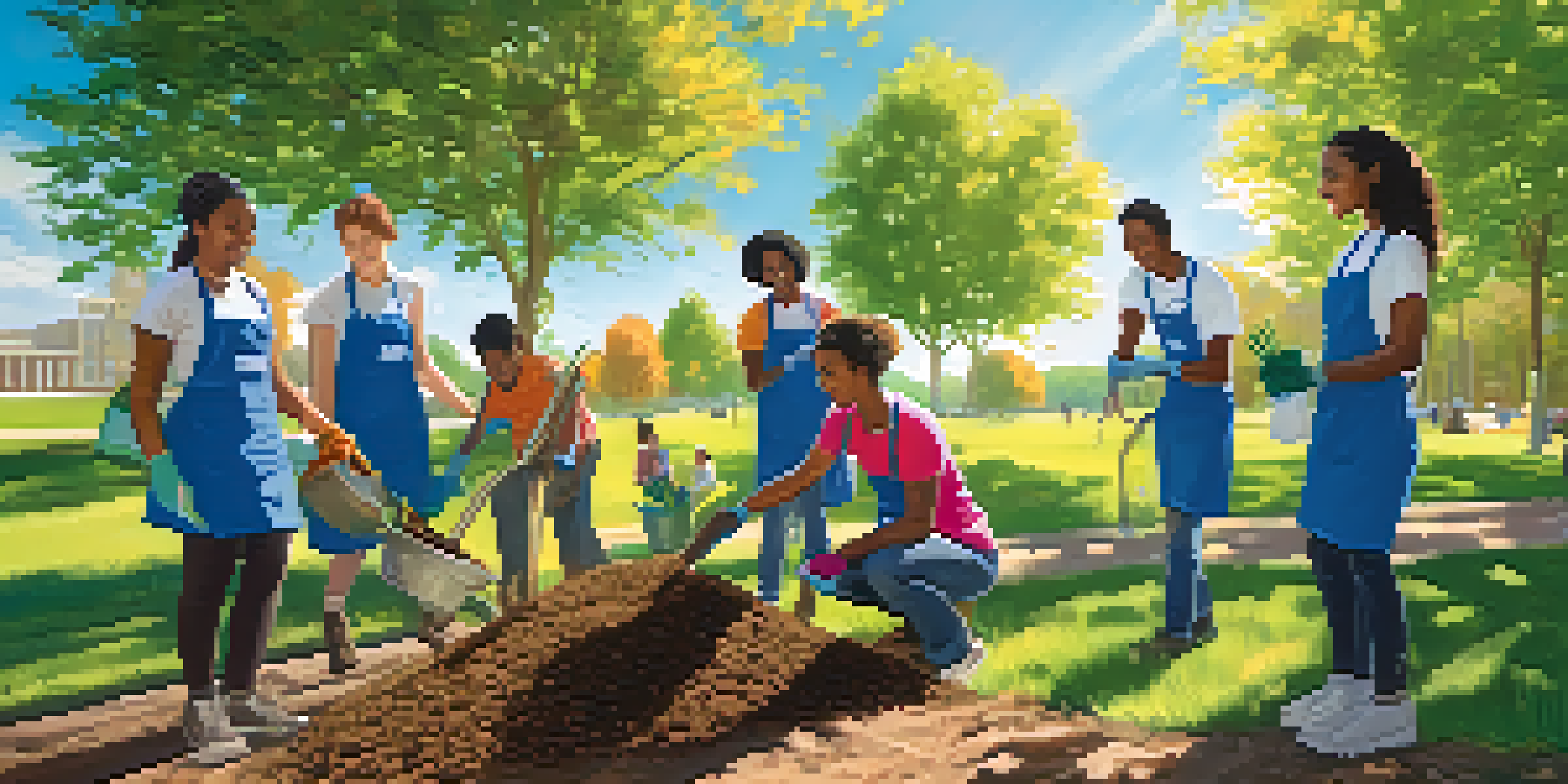Volunteer Opportunities for Students in San Francisco Area

Why Volunteering is Essential for Students
Volunteering offers students a unique chance to contribute to their community while gaining valuable experience. It's like a bridge connecting academic learning with real-world applications. Plus, it enhances a student's resume, showcasing their commitment to social responsibility.
The best way to find yourself is to lose yourself in the service of others.
Many students find that volunteering helps them develop essential skills such as teamwork, leadership, and problem-solving. These skills are not just important for future jobs; they also enrich personal growth. By becoming involved, students can discover new interests and passions they may not have explored otherwise.
Additionally, volunteering fosters connections with like-minded individuals and professionals in various fields. This networking can lead to mentorship opportunities, internships, or even future job prospects. It's a win-win situation that creates lasting relationships and opens doors.
Local Nonprofits Welcoming Student Volunteers
San Francisco boasts a variety of nonprofits eager to welcome student volunteers. Organizations like the San Francisco-Marin Food Bank and Habitat for Humanity offer hands-on activities that make a significant impact. These experiences not only serve the community but also allow students to learn about social issues and engage in meaningful discussions.

Students can also explore opportunities with environmental organizations, such as the Golden Gate National Parks Conservancy. Here, they can participate in park clean-ups, habitat restoration, and educational programs. This not only benefits the environment but also instills a sense of stewardship for nature.
Volunteering Builds Essential Skills
Students develop teamwork, leadership, and problem-solving skills through volunteering, enriching both personal growth and career readiness.
Arts and culture enthusiasts can find volunteer roles at local museums and theaters, such as the San Francisco Museum of Modern Art. These positions often involve assisting with events, guiding tours, or helping with educational programs. It's a fabulous way for students to immerse themselves in the creative community.
Finding Volunteer Opportunities Online
In today’s digital age, finding volunteer opportunities has never been easier. Websites like VolunteerMatch and Idealist allow students to search for causes they are passionate about. Users can filter results by location, interests, and time commitment, making it simple to find the perfect fit.
Volunteers do not necessarily have the time; they just have the heart.
Social media platforms also serve as great resources for discovering local volunteer events. Many organizations post calls for volunteers on their Facebook pages or Instagram accounts. Following these accounts can keep students informed about upcoming opportunities and community needs.
Additionally, university career centers often feature volunteer opportunities in their newsletters or online portals. Students should take advantage of these resources, as they provide tailored options that align with their academic schedules and personal interests.
Building Skills Through Community Service
Volunteering is not just about giving back; it’s also an excellent way for students to build and refine their skills. For instance, working with a nonprofit can enhance communication abilities as students interact with diverse groups of people. This experience can be particularly beneficial for those pursuing careers in fields such as education, social work, or public relations.
Moreover, many volunteer roles require project management and organizational skills. Students may find themselves planning events, coordinating activities, or managing resources. These tasks mirror real-world job responsibilities, providing a practical learning experience that goes beyond the classroom.
Networking Opportunities Abound
Engaging in volunteer work allows students to connect with professionals and peers, potentially leading to mentorship and job opportunities.
Finally, volunteering can teach students the importance of adaptability and resilience. Working in various environments and facing unexpected challenges fosters a mindset that is crucial in both personal and professional life. These lessons often lead to increased confidence and a greater sense of self-efficacy.
Making Connections Through Volunteering
Volunteering provides an excellent platform for students to network and make lasting connections. Engaging with fellow volunteers and staff members can lead to friendships and professional relationships that extend beyond the volunteer experience. These connections often create a sense of community that enriches the overall experience.
Furthermore, many organizations offer training and workshops for their volunteers. These events not only provide valuable knowledge but also serve as networking opportunities with professionals in various fields. Students can gain insights and advice that may aid them in their future career paths.
Additionally, volunteering can open doors to internships or job opportunities. Many organizations value their volunteers and may consider them for future paid positions when they become available. It’s a great way to get a foot in the door and showcase one’s skills and dedication.
Creating a Balanced Schedule for Volunteering
Finding the time to volunteer as a student can seem overwhelming, but with careful planning, it’s achievable. It’s essential to prioritize activities that align with personal interests and academic commitments. By integrating volunteering into their routine, students can maintain a healthy balance between service and studies.
One effective approach is to set specific volunteering goals, such as dedicating a few hours each month to a cause. This makes it easier to stay committed without feeling burnt out. Students can also explore group volunteering opportunities, which can turn service into a fun social activity with friends.
Long-Term Benefits of Service
Volunteer experiences enhance career prospects and foster a commitment to social change, benefiting both the individual and the community.
Lastly, flexibility is key. Many organizations offer various shifts and roles, allowing students to find opportunities that fit their schedules. Being open to adjusting plans while maintaining a commitment to service can lead to a fulfilling volunteer experience.
The Long-Term Benefits of Volunteering
The impact of volunteering often extends beyond the immediate experience. Many students report enhanced career prospects as employers increasingly value volunteer experience. This can set candidates apart in a competitive job market, showcasing dedication, initiative, and a well-rounded character.
Moreover, volunteering can lead to personal growth and a deeper understanding of social issues. Students often emerge with a broader perspective on life, empathy for others, and a commitment to social change. This newfound awareness can influence their choices and actions long after their volunteer service ends.

Ultimately, the relationships formed and the skills acquired through volunteering can last a lifetime. The experiences may inspire students to continue serving their communities long after graduation, creating a cycle of giving that benefits society as a whole. It's a win-win that enriches both the volunteer and the community.